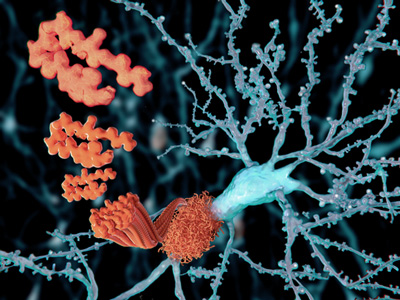AChE peptide key driver for neuronal death in Alzheimer’s
Posted: 1 March 2016 | Victoria White | No comments yet
The AChE peptide has been shown to drive production of both amyloid and hyperphosphorylated tau in Alzheimer’s disease…


Neuro-Bio Limited has described a new model for the mechanism of neurodegeneration leading to Alzheimer’s disease and its potential for new treatments.
Alzheimer’s is characterised by, amongst other factors, the presence of amyloid, in its various forms, and hyperphosphorylated tau leading to cognitive impairment. The research suggests that a previously undiscovered mechanism in a key group of neurons affected in a neurodegenerating brain is the key driver of the continuing cycle of neuronal cell death. It could be possible to halt the progression of the disease by intercepting this mechanism.
Researchers at Neuro-Bio have now validated a novel theory for the continuing cycle of neuronal death that typifies Alzheimer’s and other neurodegenerative disorders such as Parkinson’s and Motor Neurone Disease. The key driver is a 14 amino acid peptide (‘AChE peptide’) that originates from acetylcholinesterase (AChE), an enzyme essential in breaking down a well-known chemical messenger between neurons, but increasingly recognised as a signalling molecule with non-enzymatic functions. Whilst the existence of the AChE peptide and its link to neurodegeneration have been previously proposed in work by Professor Susan Greenfield, founder of Neuro-Bio, these are the first reports of its detection in both human and rat brain and its actions in driving an Alzheimer-like biochemical profile.
AChE peptide drives production of amyloid and hyperphosphorylated tau
In studies, levels of the novel peptide were raised in Alzheimer’s midbrain and cerebrospinal fluid compared with controls, and demonstrate that, in vitro, the peptide drives production of both amyloid and hyperphosphorylated tau. The damaging effects of either the AChE peptide or amyloid are shown to be blocked by a novel prototype drug (NBP-14), a cyclised form of the AChE peptide. NBP-14 intercepts the action of the AChE peptide on the alpha-7 nicotinic receptor, which is found on the outer surface of neuronal cells. The effects of the AChE peptide and their blockade by NBP-14 are demonstrated in ex vivo rat basal forebrain, using real-time optical imaging of large-scale, transient ‘neuronal assemblies’.
Professor Susan Greenfield, CEO of Neuro-Bio, commented: “These publications are the culmination of some 40 years research from our lab building up a picture indicating that the naturally occurring AChE peptide is a pivotal signalling molecule in a mechanism underlying Alzheimer’s and related disorders. We are encouraged by the potential for the prototype compound NBP-14 to block the activity of this peptide and also by the possibility of monitoring the peptide as a biomarker for early, even pre-symptomatic diagnosis.”
Professor Terry Sejnowski, Investigator at the Howard Hughes Medical Institute and Francis Crick Professor at The Salk Institute, added: “Any new approach to Alzheimer’s disease, which is increasing in prevalence as we live longer, that shows as much promise as this new peptide should be quickly brought to the attention of the scientific community. The dominant focus on beta amyloid has side-tracked the scientific community and the potential new direction will be a surprise to Alzheimer’s researchers.”
Related conditions
Alzheimer’s disease, Neurodegenerative diseases, Parkinson's disease
Related organisations
Neuro-Bio Limited



